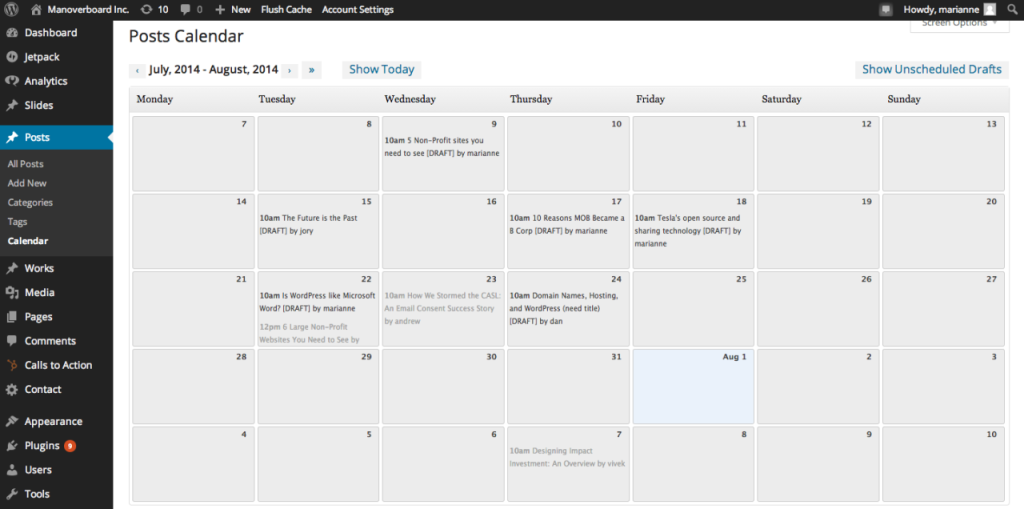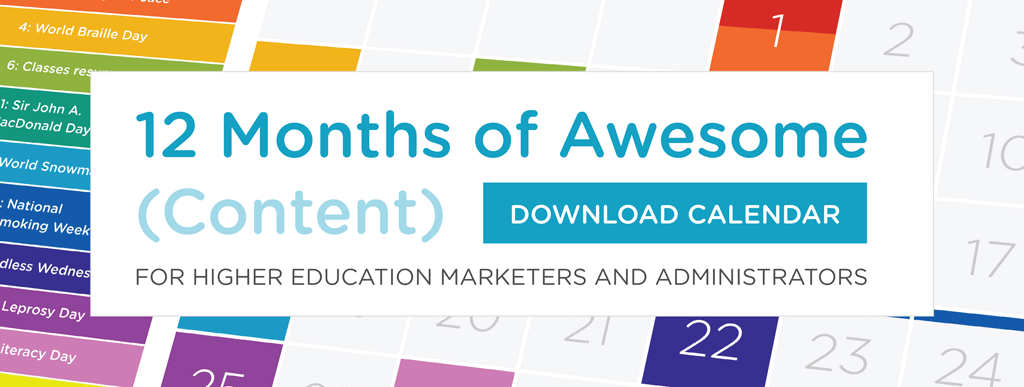You’ve probably heard the phrase “consistency is key” about a million times. You’ve seen inspirational quotes about consistency framed on boardrooms and on Pinterest for things ranging from relationships, to practicing your jump shot, to refining your professional work ethic.
Blogging, along with social media, is a key component to your university’s communications and marketing strategy. The problem, however, is doing it consistently. With a schedule filled with meetings, press releases, and memos, it’s easy to forget to update your university's blog, Twitter, and Facebook.
That’s where the editorial calendar comes in. Developing an editorial calendar to organize all of your content may just be the key to unlocking your blogging consistency.
"If you fail to plan, you plan to fail." – Benjamin Franklin
Organize Your Posts
Staying on top of your content is made much easier with an editorial calendar. You can develop a spreadsheet with headings for the dates the pieces will be published, the topics or titles, the authors assigned to writing each piece, the current status of the piece, keywords to be included, and the channels where they will be published or shared.
If spreadsheets are too old school for you, many content management system like Wordpress have plug-in features for digital editorial calendars. With just a few clicks of the mouse, you manage your drafts, assign an author, and schedule a time and date for your blog post to be published automatically.
Editorial calendars aren’t only for blog posts. They’re are also helpful to stay on top of social media updates. You can use a similar spreadsheet or a program like Hootsuite, Sprout Social, and Buffer that let you schedule your posts. Either way, make sure to share the calendar with your team and use it as reference to guide your social media strategy.

Visualize Your Strategy
Editorial calendars can actually allow you to visually see your communications and marketing strategy and how much of an impact it will make. Developing an editorial calendar helps you come up with valuable and thoughtful content ahead of time, instead of rushing to get a post done, just for the sake of publishing.
For instance, you may have come up with a ton of great ideas for blog posts during a brainstorming session with your team. Seeing your content laid out in a calendar is a great way to take a step back and see your new content strategy from a different perspective.
Arranging your new ideas into a content calendar can help you discover themes within the posts that you can develop into a series. You can see how your content flows together and pinpoint any redundancies or holes. It also allows you to spot which topics are too large and can instead be broken up into smaller, bite-sized pieces.
Accountability
Having an editorial calendar for your university's blog assigns accountability to each piece and improves communication within your team. You can divvy up the writing responsibilities amongst yourself and your team and refer to the editorial calendar to keep track of deadlines. This is especially valuable if you vary authors by having guest writers like students, professors, other faculty, staff, and guest writers.
Furthermore, an editorial calendar can really ramp up the editing process. In addition to the initial writing deadline, you can also set a deadline to have the piece reviewed, and edited by someone else on the team. That way, all content has been reviewed, refined, and approved before publishing. WordPress sites for universities and colleges makes this easy.
By developing an editorial calendar, your content will be more thoughtful, intentional, and consistent. Publishing blog posts and social media regularly makes for better SEO and drives traffic to your website, thus achieving a stronger, more consistent online presence for your university.
The editorial calendar allows you to see the bigger content picture. Seeing your content on a timeline can help you determine whether or not your current strategy is on track to meeting your marketing goals, or needs further adjustment.
Whether you decide to use a spreadsheet or a digital calendar, the bottom line is that an editorial calendar is the key to consistency.
To make your life easier, we've created a 2015 calendar for college and university folks called 12 Months of Awesome (Content). Click on the link below to download.


